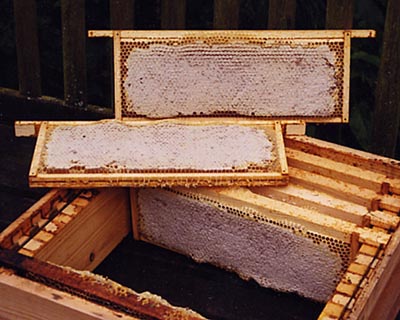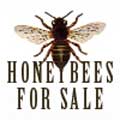Norfolk Honey - getting started in beekeeping

Getting started in beekeeping
If you want to keep bees how do you get started? Where can you get help
and advice?
Do
you read a book? Watch a video on youtube? Go on a beekeeping course? Join your local
beekeeping association? Find a bee keeper to help you? Or just buy the bees
and get stuck in?
There is no 'best way' to get started in beekeeping. But I think it is fair
to say that getting some idea of what bee keeping is all about before you actually
buy your bees can't
be
a bad
thing. If you can find a local bee keeper who is prepared to demonstrate a
basic hive inspection sometime during the bee keeping season then that would
give
you a good idea of what is involved. May, June and July are the beekeepers
busy months. During these months the bees are making honey. It is also in these
months that new queens are raised and that courses and demonstrations
take place. It's in these months that bees are readily available to buy.
When buying bees my main advice is to buy local. Bees from a beekeeper
in a similar region to you are likely to be the bees that are best suited
to your local conditions. www.honeybeesforsale.co.uk is
a site set up to help you find a local beekeeper with honey bees for sale.
When it comes to buying your bee keeping equipment you will be spoilt for choice. Not only are there many types of bee hives on the market there are also different bee keeping systems to choose from. In recent years there has been a movement advocating 'natural beekeeping' using 'top bar' hives and 'Sun Hives'. However, I think it is true to say that in the UK the majority of beekeepers use some kind of British Standard National Hive. I say some kind because again there are choices to make. Traditionally hives are made from wood. But today you can choose between having your hive made of wood, polystyrene or plastic. And even the National has an extra deep version of the standard brood box.
You may ask "when is the best time to get started?" Generally the
answer is in the spring and early (up until around the middle of July) when you can buy a 'nuc'. A 'nuc' is a smaller colony
of bees
that has been taken from a large colony or made up from a larger colony to
bread a new queen. A nuc is generally made up of 4, 5 or 6 frames of brood and
stores and has the
all important laying queen with it.
However, if you are buying a complete
hive, then you can do that at any time of the year.
The fact that you can get started in bee keeping at any time of the year means that a gift of bees in brood box is often a favorite choice for a birthday present. Or a present at Christmas. You never know if you drop enough hints about your interest in keeping bees then you may be given a hive. If you are lucky you will be given a hive with bees in it already.
If you wish to give a hive of bees for Christmas they need to be set up in the Summer. They can then be moved in the Autumn or Winter. This helps
Father Christmas who has a habit of leaving a hive of bees in the garden to
appear as
is by magic on Christmas morning.
Tips
A few tips before you pay for anything:
1. Beware of buying the beehive before you buy your bees. Many
beekeepers who sell bees also sell equipment and if bees are in short supply
they
will ration the sale of bees to their equipment customers only.
2. Make sure that before you pay for your beekeeping course
that you will be sold bees at the end of the course by the those running
the course. You don't want to get to the end of the course and then start looking
to buy bees towards the end of the season.
3. If you can put a deposit down on a nuc early in the season
and that way make sure that you do get a nuc when the time comes you could
be well advised to do so. I hear too many stories of people being let down
at the last minute who don't get the bees promissed them.
Training and Courses
Training courses in practical beekeeping give you a hands on experience.
At the end of a practical beekeeping course you will know how to open a
beehive and
what to look for in order to assess the condition of the hive. Before you
take a practical course you could be well advised to do a theory course.
Beekeeping equipment - choosing your hive
Specialist beekeeping equipment is available from a range of bee keeping
equipment suppliers and many bee keeping equipment suppliers have local
agents who hold
a selection of their stock items. Most now have web sites where you can
buy online and they will deliver hives, suits, smokers etc. to you. The
beehives I use and make up
are generally Standard British Nationals see
Although I do make up Langstroth nucs.
One note I will again make here is: beware of buying your hive
before you buy your bees. An empty hive sitting waiting for bees with
the
foundation wax going hard and uninviting (as you search for your bees) is
depressing. Most
beekeepers who will supply you with bees will also supply you with a hive
and that
could save
you
time,
money
and a
lot
of
hassle.
I'm compiling a page on the different types of beehives click
here.
Setting up your apiary
If you have neighbors close
by then the position of your beehives is important for obvious reasons
- your neighbors won't enjoy getting stung! Other than that an
open patch of ground a few yards square
that is protected from
the attention of large animals and is not exposed to excessive winds
from the North and East is all you need. The ideal number of hives is three
or
four. Tip: The floor of you beehive is best placed on a hive stand
(to save your back). You can buy a variety of hive stands but a simple
and cheap
method of making
your own is to use a paving slab and building blocks - see
More on buying your bees (See
Wikipedia on the Western Honey bee)
Not all honey bees are the same when it comes to how much honey they make,
if they like swarming or if they aggressively protect their hives. There
are different strains of honeybee
that are kept by beekeepers in the UK that have their own unique temperament
and
even each individual colony has it's own characteristics. When you are new
to bee keeping
it will
be hard
for
you
to
assess one hive
of bees
from
another.
For
example,
until you have had some
practical experience of opening up more than one beehive you won't know the
difference between calm bees and those that are not so calm.
Although you would soon know if your bees are really angry bees.
For general information on beekeeping a good web site to visit is the British
Bee Keeper's web site www.britishbee.org.uk
They will also help you find your local Bee Keeping Association
- click
here to go to the Norfolk Bee Keepers site
Most counties in the UK have beekeepers association that are affiliated
to the BBKA There
is also a growing list of links to beekeeping association's web sites here
If you have questions that you think I can answer please contact me

